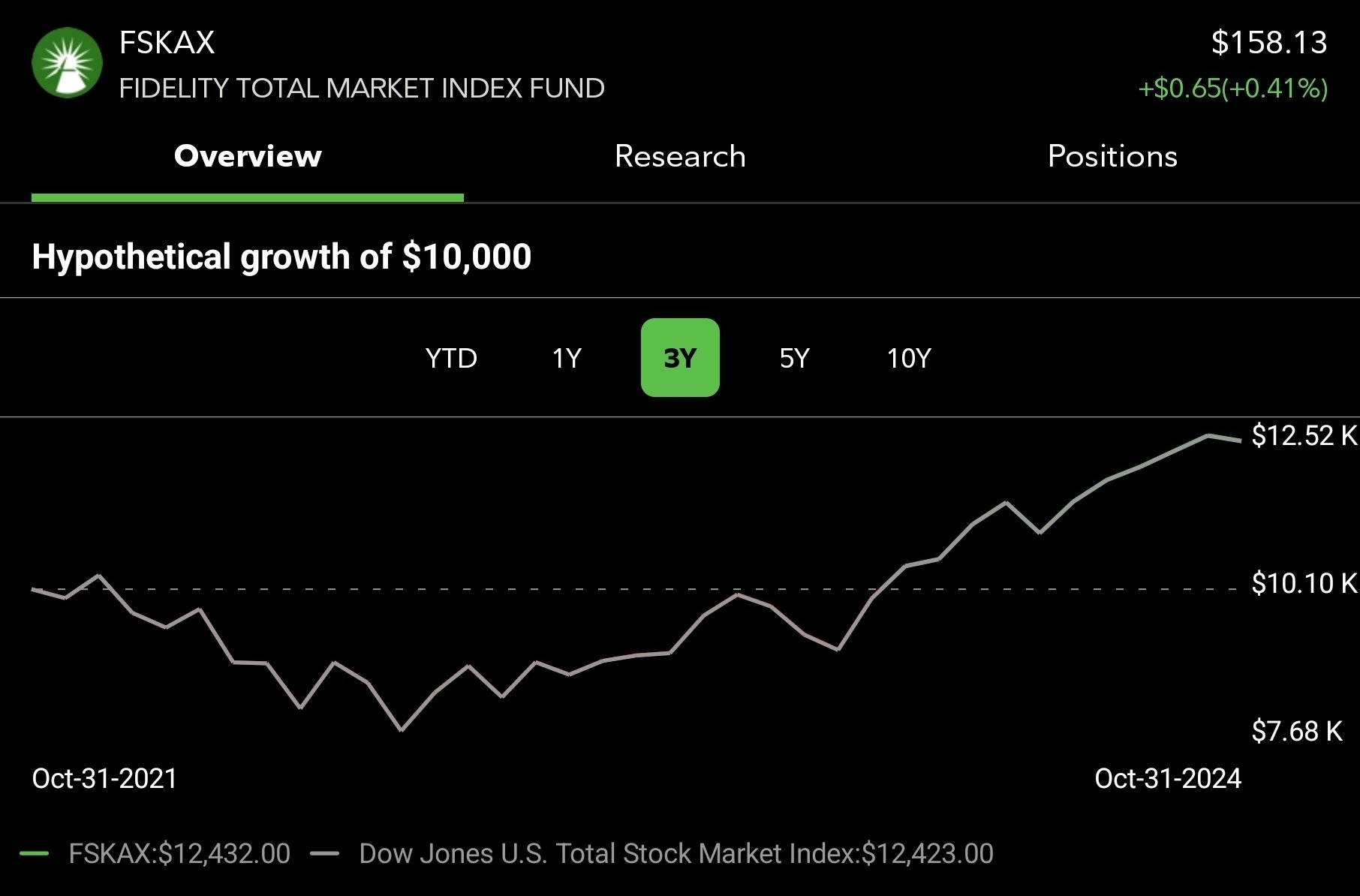My retirement fund that I just started was worth $15k in December of 2021. Then, May of 2022, our area was hit really hard. My retirement plan went down to $7k. Today, it’s worth $11k. I lost $4k on my retirement plan. It’s invested in total market funds, some tech, some big cap companies, and healthcare. But every sector has been ravaged by the stock market changes.
Are you not adding to it steadily?
Average index funds over the long term mathematically prove you wrong. Short term anecdotes don’t disprove 50-70 years of proof.
My retirement account has roughly doubled between Dec 2021 and now, I basically only invest in mutual funds and ETFs with a medium risk, low fees, and high return according to Morningstar ratings (I’m not sure how reliable those metrics are but it’s what shows up when browsing funds on fidelity and it seems to be picking good options so far)
JFC. Just buy a target date fund. This post makes it clear that you don’t really know what your’re doing so please do yourself a favor and just pick a target date fund like this (or equivalent if Vanguard funds aren’t available to you) and don’t mess with it until retirement.
If you want to take the time to learn more about what you should probably be doing, here are some resources:
I’ve done plenty of research and invested in a 3 fund portfolio that my financial advisor suggested. My 401k for work is a fidelity 2050 target date fund. Why so rude?
He’s being “rude” because you’re losing faith in your fund for no reason. Thankfully you have a financial advisor. The problem is not US retirement plans, the problem is it’s only been a few years. If the target date is 2050 then assuming capitalism doesn’t collapse entirely, you’ll be fine. Look at it on the larger time scale that it is. A few bad years is normal fluctuation.
Because you’ve come to the conclusion that “retirement in the US is a scam” evidently based on a few years of data in just your portfolio. Retirement savings is built over decades.
I’d be curious about your specific positions contributing to this graph.
If your portfolio was a Fidelity target date fund, it would not be impacted by the local industry you mention in your post.
I also happen to know more about the details of how our retirement fund recommendations to clients works at Fidelity… because I worked there for the last 5 years.
You are showing the results of poor selection on your part.
How did you manage to lose money on a 3 fund portfolio, if one of its strengths is that it never underperforms the market?
Something doesn’t add up. Sounds and looks like you gambled first and then went with a solid investment.
Maybe it’s time to think about the capabilities of your financial advisor. Is it a friend or a professional?
One thing to consider. When the stocks that are part of a mutual fund drop… then your retirement contributions will be buying them on sale.
Assuming the mutual funds are spread out to minimize risk (1 of the funds companies folds, etc) overall you’ll be better off long term.
As you age you’ll start moving your investments to more stable options (talk to a financial adviser on the specifics for your plans). This way they that won’t benefit from huge gains but also are a lot less likely to be wiped out by massive drops.
In the meantime look at how your funds are doing over time. Not even year to year but maybe every 2 or 3 years.
Invest in index funds. They are self- cleaning…IOW when a stock stops performing it is removed from the fund and replaced by a better performer.
Use a brokerage that is low fee. Fees steal your money.
Do NOT let someone manage your money that moves stocks around for fees.
Use Dollar cost averaging . Even if the market is down, keep adding regularly. Which is tied to…
Don’t time the market. You can’t win.
Don’t touch it. Don’t touch your money. Don’t incur fees and capital gains taxes. You will lose. Leave it alone.
I am up 8% average yearly over the lifetime of my fund including all the downturns, it has been stellar this year well over 12%. Is this a “get rich quick” way of doing things? Is it exciting? No. Not at all. But it works.
Investing (NOT TRADING) is EasyHard, because it’s really easy to do, but really hard not to mess with and screw it up.
don’t touch it
Don’t even look at it on a regular basis. Looking at it makes some people do self-defeating things like breaking your other great points
The stock market averages are only true if you look at it for a really long time, like 30-40 years. In 10 years, the value can definitely go down a lot, but if you view it for the long-term, it will still be an improvement.
I understand that looking at it like that is unnerving though.
Needing to choose when to retire based on whether the stock market is up or down is a dogshit system.
That’s generally why when you’re younger people tend to put their retirement funds into riskier investments and over time as you get closer to retirement you move portions of your money into less risky things that don’t have the potential volatility of the stock market so that by the time you retire you don’t have to worry about the stock market dipping and blowing out your retirement funds. At least that’s one way to do it; obviously this isn’t investment advice and you should seek your own professional investment advice.
You don’t have to choose, just keep saving and investing for 30 years.
So if the market crashes the year before I want to retire I should just put off retiring for another 30 years.
So if the market crashes the year before I want to retire I should just put off retiring for another 30 years.
Thats not how to do it. As you approach retirement age (5 to 10 years out), you move your money out of riskier (but higher return generating) stocks and into safer (but lower performing) investments like bonds or even cash (actual cash, CDs, Tbills, etc). Generally you also don’t move it ALL out of riskier stock. You don’t need 100% of your savings on day 1 of retirement, so you convert a few years worth (5 maybe?) to safe stuff and let the riskier stuff ride usually gaining more value even after you retire.
No. If you’ve been saving for 30 years, then you’ll have 30 years of accumulated 10±20% annual gains, which should be something like 16x your start, but could be 100x if you’re lucky or 1x if you’re not. Regardless, an historic crash on retirement day may take that down to 12x your start, which is still pretty good, and will be fixed by the following couple years.
You should have a nest egg by then that even in a crash, a year of withdrawal isn’t significant
I’ll let the vast majority of Americans who can’t afford to save up a nest egg because of wealth inequality that they are doing it wrong.
Also the ones who choose to retire because of medical issues who have to spend any money not in a retirement account before insurance pays out that they did it right, but they are fucked anyway.
The system is shit even if there are ways for the well off to work around it.
I don’t see what’s so difficult to understand. If you can’t retire at 60, try again at 90. At 120, you really should consider an alternative. If you have to wait until 150, retirement will likely be a lower-priority issue. \s
Like one of the other replies mentioned, when you get closer to retirement, more of the money should get shifted from stocks to more stable but lower return investments like bonds and such that are not affected by a stock market crash. Usually you can set a retirement age in the management portal of your 401k and the management company in charge of your 401k uses it as a guide to move the money into the more stable investments.
Only 32% of people have 401k accounts.
Only 32% of people have 401k accounts.
45% of 18-29 year olds have a retirement account. That number keeps rising to 77% of people 60+ having a retirement account. source
You don’t need a 401k account to save for retirement. You can do this same savings/investing in an IRA or even an brokerage account (but you wouldn’t get the tax benefits). There are ZERO employer requirements to opening an IRA, you just have to be someone that earns money.
you just have to be someone that earns money.
Earns enough money to set some aside for retirement.
401k is the just liquidity for billionaires, some plebs benefiting from it is an unintended consequence and owners are working pretty hard to ensure it doesnt happent too often.
Retirement is a financial state. Set a goal and work until you get there. Diversify your investments and basically just ignore the market.
Unless there is a total collapse of the economy you’ll be fine and if there is a total collapse it’s unlikely you were in a position to captialize on it anyway.Yea, you made a shitty bet, lost your ass, sold at the bottom, then reinvested into index funds, which has been steadily creeping up. That’s on you, bub.
How did you manage this. The market has been up every single year since you started.
Tech is a wild ride.
Index funds are boring but not stable.
S&P 500 is always a good bet.
You need to talk to someone about your risk tolerance. Clearly you’re not willing to accept short term losses and you’re going to be prone to panic selling and holding cash when you could be buying dips. Your risk tolerance does not match your portfolio.
I’m in a Vanguard target fund and I’m up 7.8% over the same period. There was a lot of red until December 2023, when it broke even. All gains are pretty much from this year looking at my returns chart.
Which funds did you invest into? I’ve studied like 25 hours of investing. Haven’t found a good fund yet except FSKAX and VTI
If you have an account with Fidelity, FZROX should be a better choice than VTI. Unless you enjoy investing or want to really get into it, either do a target date fund for the easiest and lowest risk, or a total market fund like VTI, or an S&P500 fund like VOO. You really don’t need to overcomplicate beyond that, except to potentially start buying bonds when you are nearing retirement if you didn’t choose a target date fund.
I recommend FSKAX over FZROX. There are few minor differences. Yes FZROX has a lower expense ratio, but it BARELY lower when compared to FSKAX. My understanding is the biggest downside to FZROX is that you can’t hold that in any other brokerage. So if one day you decide you don’t like Fidelity you have to sell all your FZROX and then buy something else offered at the other brokerage. In a retirement fund this isn’t so much a big deal, but could mean you miss out on gains between the sale and the purchase of whatever else you replace it with.
If you’re investing in a non-retirement account this is a BIG deal, as any gains would be taxed at the time of sale. This can mean you pay 15%-20% on the gains just to switch brokerages. FSKAX doesn’t have that limitation, and you’d be able to simply do an “in kind” transfer of the securities to your new brokerage without any tax events/consequences. To me, that portability is worth the tiny different in expense ratio.
Mainly VFFVX, which is up 4.46% over a 3 year period, but I have about 20% in various other funds.
I let my bank’s financial advisor handle that. They have apps that calculate everything.
They do. And you can generally trust banks to try and sell you what’s most profitable to them.
They are fiduciaries.
Fiduciary is a legally defined term. Fiduciaries are expected to exercise a duty of care and a duty of loyalty to clients, and as a result, are “held to the highest standard of conduct.” Fiduciaries have a bond of trust with another person (called the beneficiary or principal) and have a legal obligation to act for the beneficiary’s benefit – not their own.
That’s all fine, but just be sure you know how much you’re paying them for that service. Before we switched to self-managed a number of years ago our guys were taking 1.4% off the top of the whole account just to pick a bunch of index ETFs. Market goes up 5% and I only see 3.6% of it. Not good. Plus the ETFs they picked had higher expenses than just going with a whole market choice.
They offered to get us on a plan at 1%. Ha, no thanks.
Yeah that’s bad. We’re with JP Morgan through our local Chase branch and their fee when all is said and done is averaged down to less than 1% of the total account balance.
That’s better for sure. Still too much for me. Our all-in investment cost is 0.05% now. That’s a lot of free compounded yield compared against guided investments which are themselves no better than the average market (on average).
Who are you with?
We are on Fidelity. But self-directed on all the big ones are no fee and free trades these days - Vanguard, Fidelity, Merrill and probably others. Just need to watch the fund/ETF fees to have a total cost.
Haven’t found a good fund yet except FSKAX and VTI
You found the good ones. No need to go looking further.
I’m in BTC S&P 500 Index, BTC Russell 2500, BTC ACWI EX US IMI, and BTC US Debt and am at 11.93%, 3.6%, 3.87%, and -1.34% over the last 3 years. Over the last year though, it’s 36.36%, 26.36%, 25.22%, and 11.6%. My funds are Large Cap Blend, Small Cap Blend, Foreign Blend, and US Bonds at roughly 67/7/20/6 percent division of my portfolio.
I think you just got into the market at the height of the markets during COVID and are still digging your way back out. You could try diversifying a little bit in a similar fashion to spread the gains and losses out a bit over both large and small US companies and foreign markets.
I’ve put my ira into FNILX. Zero fees and consistently beats 10%
Yeah there is something else going here. No domestic markets are actually down in this interval. OP must have bought some individual stocks.
Or be invested in managed funds with high fees that are performing poorly vs index funds. My 403b is definitely up over this same period, but I’m only in index funds
Yeah, this is FSKAX over 3 years. I have a lot of my portfolio in it and it does well. It’s up 24% over that period.

 The 2030 target fund is still down 8.8% since that date.
The 2030 target fund is still down 8.8% since that date.That’s messed up.
Not saying that’s not frustrating, but don’t fixate too much on the ups and downs of it if you’re not set to retire soon. What the stock market is doing now is barely going to impact the value of your retirement fund in 20, 30, etc years.
Also, if they are look at the ups and downs, hopefully they invested when it hit the dip.
Retiring on $15k is a scary fucking thought.
$11k
Even scarier.
$7K a year ago
I thought you need $401k to retire.
Oh man I have some bad news for you…
The OP is missing something. The two specific funds of his 5 holdings that he said he bought are both up. The 3 he didn’t provide specifics are up too.
$15k should be all in Vanguard total market index. Smaller funds are riskier and could take decades to show their greater returns.
If the market is down then you just get to buy more at a discount. It should pay off in a few decades
What kind of fees are you paying? That chart does not reflect the market. For instance, if you had invested in a low management fee S&P 500 index find you would expect to have seen a 50% increase over the same period.

I like to go a step further and do a target-date retirement fund. I think Vanguard funds are based on index funds, but they will reduce how aggressively they invest as you approach your retirement date. And the fees are very low.
The close to retirement ones suffered that year. The 2030 target lost 25% in less than a year recently and hasn’t recovered. Ironically, the high risk ones have been less risky during COVID than the low risk ones.
Interesting. I’m targeting 2065 retirement, so I’ve got a long time. But I guess that fund could suffer from the same issue? Or maybe I should assume the same fate based on past events.
Not sure. I’m guessing interest rate stuff will mess with anything with bond holdings, so that probably had stuff to do with it. Other than that… I don’t know if I can convey a big enough shrug in text form.
If you’re really hands off these are a good choice. But if you are willing to rebalance a couple of times a year, it’s unnecessary to pay the extra fees associated with these funds.
I do like the automatic set it and forget it. Especially with scheduling transfers into investment accounts. I could probably get into rebalancing short-term, but I think long-term I would get bored and forget.
Yeah it’s not for everyone, but I just have an event on my calendar for every six months, and I just rebalance when it goes off. Only takes a short while, especially if you are using some tool that will tell you what your weights are.
Any tools you recommend? Also, how sure are you that the cost savings actually make it worth the effort? My gross expense ratio is 0.08% (I think I’m looking at the right number?)
Check the vanguard target retirement income fund (vtinx) and other similar funds. There was a dip in 2021 that absolutely destroyed a number of retirements, my patents included, despite being low risk options. Total bond index funds also suffered for some reason, and those are as low risk as you can get. Every other fund I have is doing great, but the ones that are supposed to be safe are not doing great.
That drop was when the Fed was raising interest rates to stall inflation. Interest rates up, bond values down. But the drop in VTINX was only 20% over all of 2022, where OP is showing 50% in maybe the first quarter.
Incidentally, the sensitivity to interest rates is why I don’t like bond funds. If you buy actual bonds, you get the face value back at maturity, where bond fund are forced to mark them all to current market prices to calculate NAV. IMO, this negates the main “safe” factor in holding bonds.
Would you give some examples of bonds that you’re talking about (rather than bond funds)? I’m thinking you mean something from Treasury Direct: Treasury bonds (T-bonds), Treasury Inflation-Protected Securities (TIPS) and/or I bonds.
https://www.nerdwallet.com/article/investing/how-to-buy-bonds
Treasuries are nice because they’re convenient and low buy-in, but their yields are crap, sometimes a little above inflation, sometimes below. TIPS are a decent way to hedge the inflation risk, but (IMO) it’s still really for people who are more worried about losing their savings than living off it. (i.e.: if you have, say, $1e8, you can live pretty comfortably off $1e6, even $1e5 in a lean year, so your rate of return doesn’t really matter)
For me, personally, the limited bond exposure I have is all corporate and mostly junk, bought through my broker in the secondary market, with maturity 10-20 years out. Until fairly recently, junk bonds were the only way to get yields above 4%, and that’s kind of my mental benchmark for gaining relative to inflation. One downside of corporate bonds is they generally have a $10k minimum.
Dude isn’t in index funds…nuff said. Mine has more than doubled since 2021
This is the actual problem with these types of retirement plans, though. People are expected to know a lot about managing the investments themselves. There’s a whole industry whose job it is to give you bad advice. The real advice is “drop it in a mix of an sp500 index fund it and bonds according to your risk level” and the rest is bullshit.
There is a large portion of the population that doesn’t know anything about how 401ks work. They are told there employer will take 3% or such out of their income and put it into a 401k account, and some part of that money will be matched by the employer (varying).
Those who don’t know the market don’t touch the money, it is invested for them. So it is very possible whoever posted this is among those people. It is not always wise on their end, but if a professional can lose money investing large amounts for companies like that, so could an inexperienced person. The annual report for 2023 for my company’s investments saw loses as well. The little money I had was elsewhere so I lucked out on that part.















